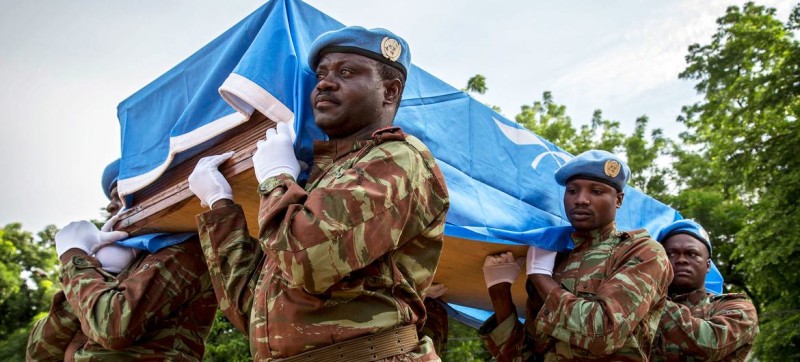MINUSMA/Marco Dormino MINUSMA Peacekeepers held a memorial ceremony in honor of two fallen blue helmets, killed during an improvised explosive device (IED) explosion. (File)
Since 1948, malicious acts have taken the lives of 1,056 personnel serving in UN peacekeeping operations and led to 3,080 more suffering injuries, he said.
At the launch, he recognized colleagues from several troop and police-contributing countries whose personnel were killed or injured serving under the UN flag, saying, “their sacrifice will not be forgotten”.
Tweet URL
However, serious challenges in bringing criminals to justice have led to a low prosecution rate, and contributed to a cycle of impunity that continues to embolden offenders.
Noting that the Group of Friends will be significant in promoting accountability and facilitating capacity-building and technical assistance to host State authorities, Mr. Lacroix offered the UN’s full support, including by monitoring progress and serving as a Secretariat.
‘Notable progress’
Although few perpetrators have been brought to justice, he highlighted some “notable progress” since 2019.
In the Central African Republic (CAR), the Democratic Republic of the Congo (DRC) and Mali – the three countries where 84 per cent of fatalities have occurred across peacekeeping operations since the beginning of 2013 – there has been “an increase in the number of alleged perpetrators identified and detained and an increase in the percentage of cases with confirmed national investigations”, Mr. Lacroix said.
“Most importantly, 66 individuals have been convicted” in CAR, DRC, Lebanon, and Mali for killing UN troops, he added.
Unacceptable track record
Referring to the UN peacekeeping mission in Mali by its French acronym, the peacekeeping chief pointed to the 10 October deaths of four MINUSMA colleagues from Chad “due to the explosion of an IED in Tessalit”, which served to underscore “the continued importance of this issue”.
And malicious acts since 26 July, have taken the lives of Indian, Moroccan and Pakistani peacekeepers serving in the UN Organization Stabilization Mission in the DRC (MONUSCO) and three Bangladeshi blue helmets in the UN Multidimensional Integrated Stabilization Mission in the CAR (MINUSCA).
“Twenty-nine peacekeepers have died in such circumstances since the beginning of this year”, the UN peacekeeping chief said, extending “deepest condolences to the Governments and families of those who have fallen”.
Only a few hours before Thursday’s meeting, another peacekeeper, from the UN mission in southern Lebanon, UNIFIL, was killed, after coming under attack.

UN Photo/Catianne Tijerina UN peacekeepers patrol Bambari in the Central African Republic.
Bring culprits to justice
“It is critical for countries hosting operations to bring perpetrators of these crimes to justice, in accordance with their international obligations”, he stressed.
Mr. Lacroix recalled the Security Council’s 2020 resolution (2518) on the safety of peacekeepers, which calls “on all Member States hosting peacekeeping operations to promptly investigate and effectively prosecute those responsible for attacks on United Nations personnel”.
Furthermore, in 2021 the Council adopted resolution 2589 on strengthening accountability for crimes committed against peacekeepers, calling for a renewed focus on bringing perpetrators against UN personnel to justice.
While the primary responsibility for bringing criminals to account lies with host States, he highlighted that the UN would continue to pursue accountability, particularly in CAR, DRC and Mali.
Supporting host countries
Although a working group has been supporting host countries in investigating and prosecuting these offences since 2019, important challenges remain.
“These crimes are often committed in areas where the authority of the State may be limited and national law enforcement personnel may be absent”, often creating roadblocks for witness security and evidence collection and preservation, the senior UN official said.
Moreover, personnel rotation and repatriation are obstacles to witness testimonies.
“These challenges are further compounded in some instances by the absence of political will to pursue these cases”, he flagged.

UN/Byobe Malenga
Moving forward
Mr. Lacrox recalled that bringing perpetrators to justice, in accordance with their international obligations, is outlined in “status-of-force or status-of-mission agreements, in addition to other instruments”.
Maintaining that international support is “indispensable to achieving success”, he noted that it could take the form of political pressure, or through the provision of technical and material assistance, based on national plans and priorities.
While field missions play important support roles within their mandated responsibilities, he upheld that support from Member States was “essential”, such as by deploying specialized personnel to assist national authorities in investigating and prosecuting these cases.
Stating that advocacy was “vital”, Mr. Lacroix strongly welcomed the official launch of the Group of Friends.




Comments are closed.